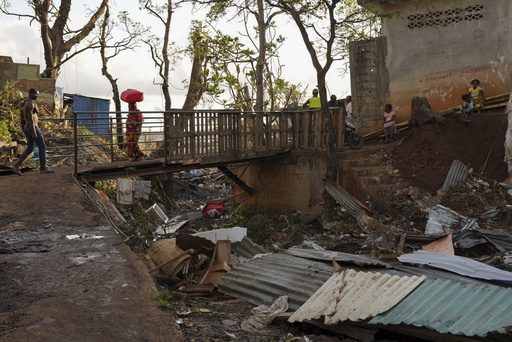Mamoudzou, Mayotte — Four days following the destructive impact of one of the strongest cyclones in nearly a century on the French island territory of Mayotte, residents gathered around their limited water supplies and each other as they tried to make sense of the devastation. Many were caught off guard by the severity of the storm, which inflicted significant damage and led to chaotic conditions across the island.
As reporters arrived in the humid capital before nightfall, French military teams and local officials worked diligently to clear fallen palm trees obstructing roads in anticipation of President Emmanuel Macron’s visit. Streets were strewn with the debris of makeshift homes that housed many migrants, complicating efforts to account for the fatalities resulting from the disaster.
Samuel Anli, a 28-year-old survivor, described the cyclone as “apocalyptic,” sharing harrowing details of sheltering in a windowless office for hours as winds exceeded 220 kph (136 mph), ripping apart walls and doors. Alongside his coworkers, he struggled to hold the office door shut, convinced that a little more time could have proven fatal. His family faced injuries from flying debris, while his own home suffered considerable damage.
French authorities termed the cyclone a “catastrophe of exceptional intensity,” stating that while the confirmed death toll currently stands at 31, the actual numbers could be far higher. This may be partly attributed to the rapid burial customs within their Muslim community, with reports emerging of hasty interments and the distressing smell of decaying bodies.
Located in the Indian Ocean, Mayotte lies between the east coast of Africa and northern Madagascar and is recognized as France’s least affluent territory, attracting numerous migrants seeking opportunities in Europe. The cyclone ravaged numerous neighborhoods, with many residents dismissing early warnings, believing the storm would not pose a significant threat.
With basic infrastructure heavily impacted, residents were left scavenging for food in a landscape transformed by destruction. Phone and internet connectivity remained unreliable, complicating recovery efforts. In Mamoudzou, survivors lined up for water and to charge their mobile phones, while gas stations saw long queues as people awaited fuel.
In response to the severe situation, the French government deployed security forces to manage food distribution points and maintain order amidst the growing crowds seeking assistance. Reports indicated that over 8,800 people had been provided emergency shelter.
On the main island, Grand Terre, French military units established a presence at the primary airport, which remained closed due to extensive damage. Prime Minister François Bayrou revealed that over 1,500 individuals suffered injuries, with more than 200 classified as critical. Authorities are concerned about the potential for hundreds or even thousands of deaths, with upwards of 100,000 locals in a precarious situation.
Meanwhile, on the nearby French island of Reunion, family members collected aid donations for those affected in Mayotte, with many expressing concern about their relatives facing shortages of food and water. A 19-year-old individual voiced her sense of helplessness regarding the situation unfolding in Mayotte.
Health Minister Geneviève Darrieussecq expressed worries regarding potential outbreaks of disease, emphasizing that individuals were resorting to unsafe water sources. The risk of a cholera epidemic has been underscored, particularly after a previous outbreak of drug-resistant strains was reported earlier in the year.
In response to the dire needs, authorities announced the distribution of 23 tons of water began, while the minister overseeing overseas territories acknowledged that the water supply system was operating at only 50% capacity and raised concerns about its quality. Electricity services were also in a partial state of restoration.
On Wednesday, it was announced that Mayotte would be placed under a “state of extraordinary natural disaster,” a designation never before invoked for French overseas territories. This emergency declaration is intended to expedite aid and streamline assistance processes.
The local hospital suffered significant damage, but plans for a field hospital to be operational by early next week are underway. Additionally, a naval vessel is scheduled to arrive with 180 tons of essential supplies and equipment.
Macron plans to visit Mayotte along with the shipment of aid, intending to examine the hospital and impacted neighborhoods. In a statement, he highlighted the grim reality faced by many, just a few thousand kilometers from the mainland.
In a demonstration of solidarity, a recent public fundraising program raised 5 million euros (approximately $5.24 million) to support the recovery efforts in Mayotte through the Foundation of France charity.



